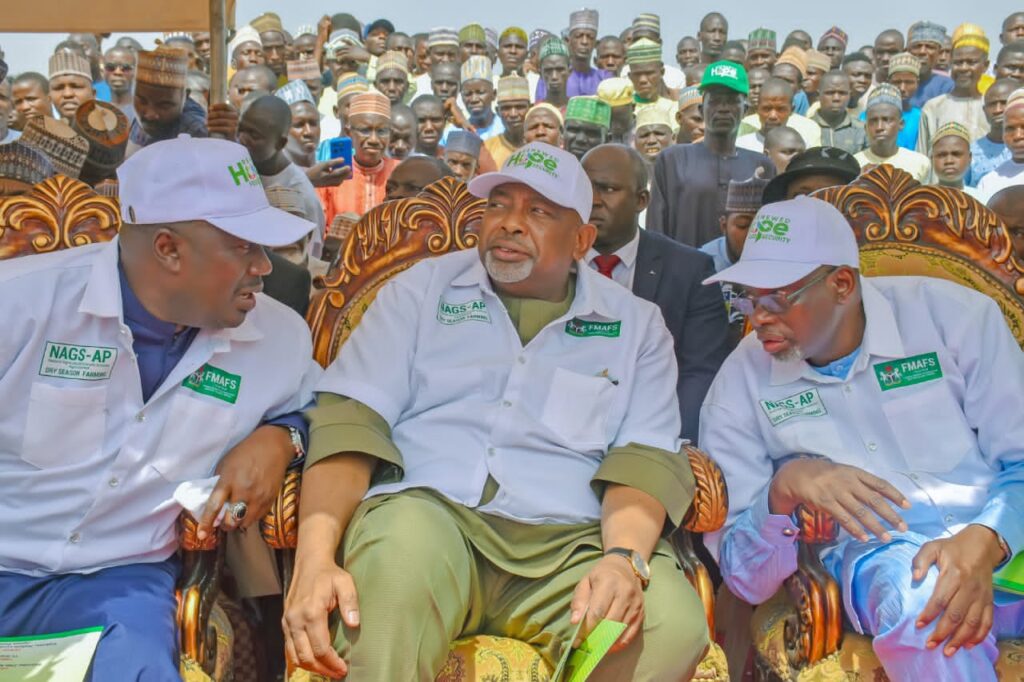Read in
Minister of State, Federal Ministry of Agriculture and Food Security, Sen. (Dr.) Aliyu Sabi Abdullahi (left); Minister of Agriculture and Food Security, Sen. Abubakar Kyari; and Jigawa State Governor, Umar Namadi,at the official flag-off of the 2023/2024 Dry Season Farming in Kadume, Hadejia Local Council, Jigawa State.
At the launch, held in the farming community of Kadume, Hadejia Local Council, Jigawa State, the team, led by the Minister of Agriculture and Food Security, Sen. Abubakar Kyari and Minister of State, Sen. (Dr) Aliyu Sabi Abdullahi, rolled-out the National Agricultural Growth Scheme and Agro-Pocket (NAGS-AP) project, being implemented under the African Emergency Food Production Facility (AEFPF) and funded through a loan by the African Development Bank (AfDB).
The project, to be implemented across the 36 states and the Federal Capital Territory (FCT), for three consecutive farming seasons beginning with the 2023/2024 dry season farming, is backed by a total sum of $134m allocated to Nigeria, to be utilised through the NAGS-AP, an ICT-based farm inputs delivery mechanism designed to promote transparency, accountability and easy assessment of impact.
The project comes with four mutually reinforcing components, namely, agricultural sector reforms, and improvement in the delivery of farm inputs and quality extension services, support to wheat production, and enhancement of private sector participation in the production of agricultural inputs.
Though this is not the first time dry season farming has taken place in the country, but, evidently, the present one, the first to be staged under President Bola Tinubu’s Renewed Hope Agenda, differs from the past in its scope and focus.
According to the ministry, there are also very compelling reasons for the approach being adopted. The Russia-Ukraine War has occasioned massive disruption in grains supplies around the world, with Africa (Nigeria inclusive) bearing more of the brunt.
In parts of the country where insecurity is rife, farming activities have been impacted as farmers have either been sacked from their communities by terrorists and bandits, or they have had to pay with their harvests for protection by the organised criminal elements.
In some cases, as happened in Niger State, terrorists and bandits burnt down farms and killed farmers. These unsavoury developments, along with others, such as perennial flooding and poor extension services, have resulted in lower productivity by farmers, which in turn affected the value chain, as in poultry services where the prices of livestock feeds have skyrocketed largely due to poor supplies of inputs for livestock feed production.
The NAGS-AP project aims to increase total food production to crash the continued rises in prices of agricultural commodities and make them affordable to average Nigerians, thereby further assuring food security.
Food inflation stands at over 120 per cent and about 88.5 million Nigerians are faced with inadequate food consumption and that was why President Tinubu declared a state of emergency on food security in July, 2023.
The key objective of NAGS-AP is to increase the production of wheat, rice, maize, sorghum, soya beans and cassava through the provision of relevant agricultural inputs such as fertilisers, seeds, stems, pesticides, and herbicides to the registered small-scale farmers for both wet and dry season farming across the 36 states of the Federation including the FCT.
The dry season farming NAGS–AP project encapsulates the Tinubu Administration’s resolve to expand the capacity of Nigerian farmers to engage in the cultivation of key staples like rice, maize, cassava and wheat, across the country.
These high value staples will be joined by others like soybeans and sorghum in the wet season. The aim is to increase crop yield by at least 20 per cent compared to the previous year.
According to the Minister, “In wheat alone, we aim to support between 150,000 and 250,000 farmers with 50 per cent input subsidy. Other selected staples are earmarked for similar, varied support, all aimed at significantly reducing food inflation, as well as Nigeria’s dependence on foreign import, while increasing domestic consumption. Ultimately, this will promote agricultural self-sufficiency and stimulate economic growth.”
Overall, the project is targeted to support about one million farmers with relevant farm inputs under wheat, rice, maize, sorghum and soya beans value chains, in addition to other institutional support to increase local production of the selected commodities to guarantee food and nutrition security in Nigeria.
The first-line beneficiaries of the project, therefore, are farmers involved in the identified grain production. They will be supported with relevant farm inputs to cultivate about 100,000 hectares with expected output of wheat to be added to the food reserve in order to reduce dependence on importation of the product and increase domestic consumption, particularly to the flour millers.
As part of the project, subsidized agricultural inputs will be provided to cultivate 150,000 hectares of rice, 30,000 hectares of maize and 20,000 hectares of cassava during the 2023/2024 dry season farming across the 36 states and FCT where functional irrigation facilities are available.
In a marked example of the synergy between government and the private sector to achieve stated targets for the 2023/2024 dry season, the Flour Mills of Nigeria facilitated the importation of certified wheat seeds from Mexico, in addition to seeds sourced locally in Nigeria, to meet the quantum of seeds required for planting during the season.
The farmers are also guaranteed a market for their produce as the project has in place links between the farmers and produce users.



